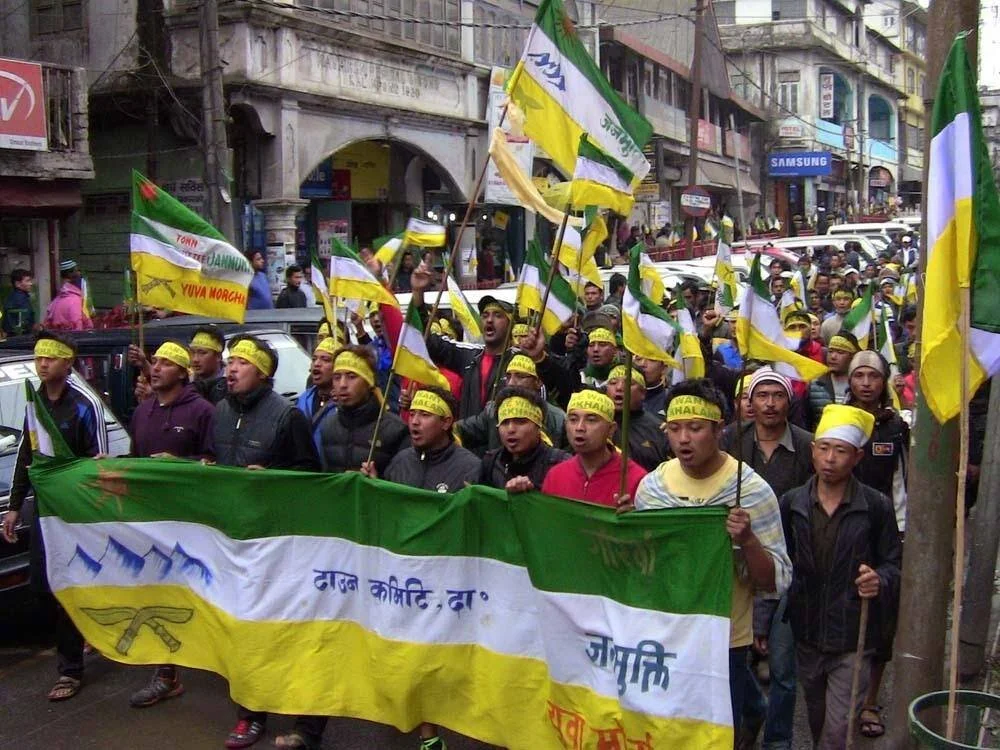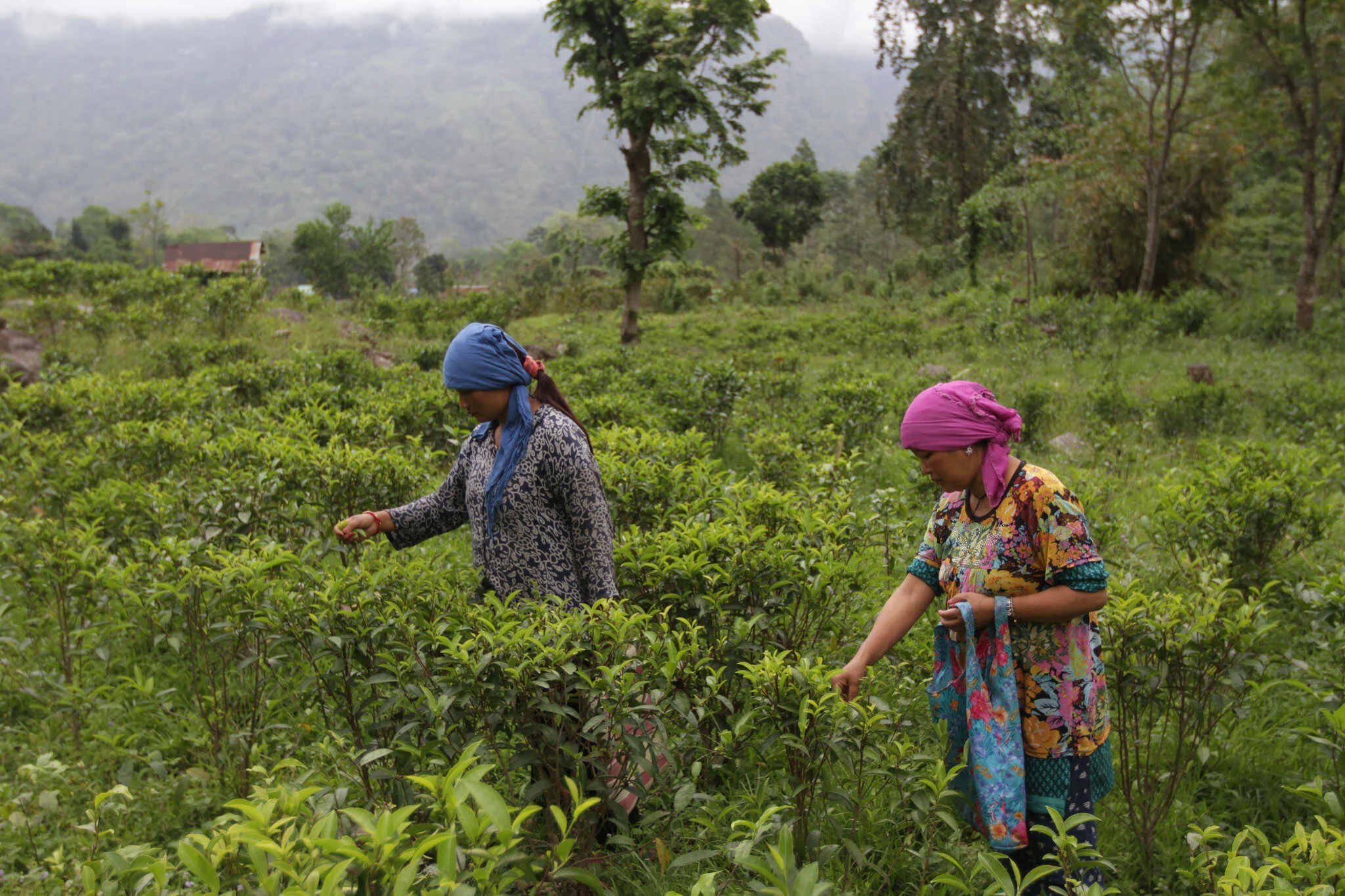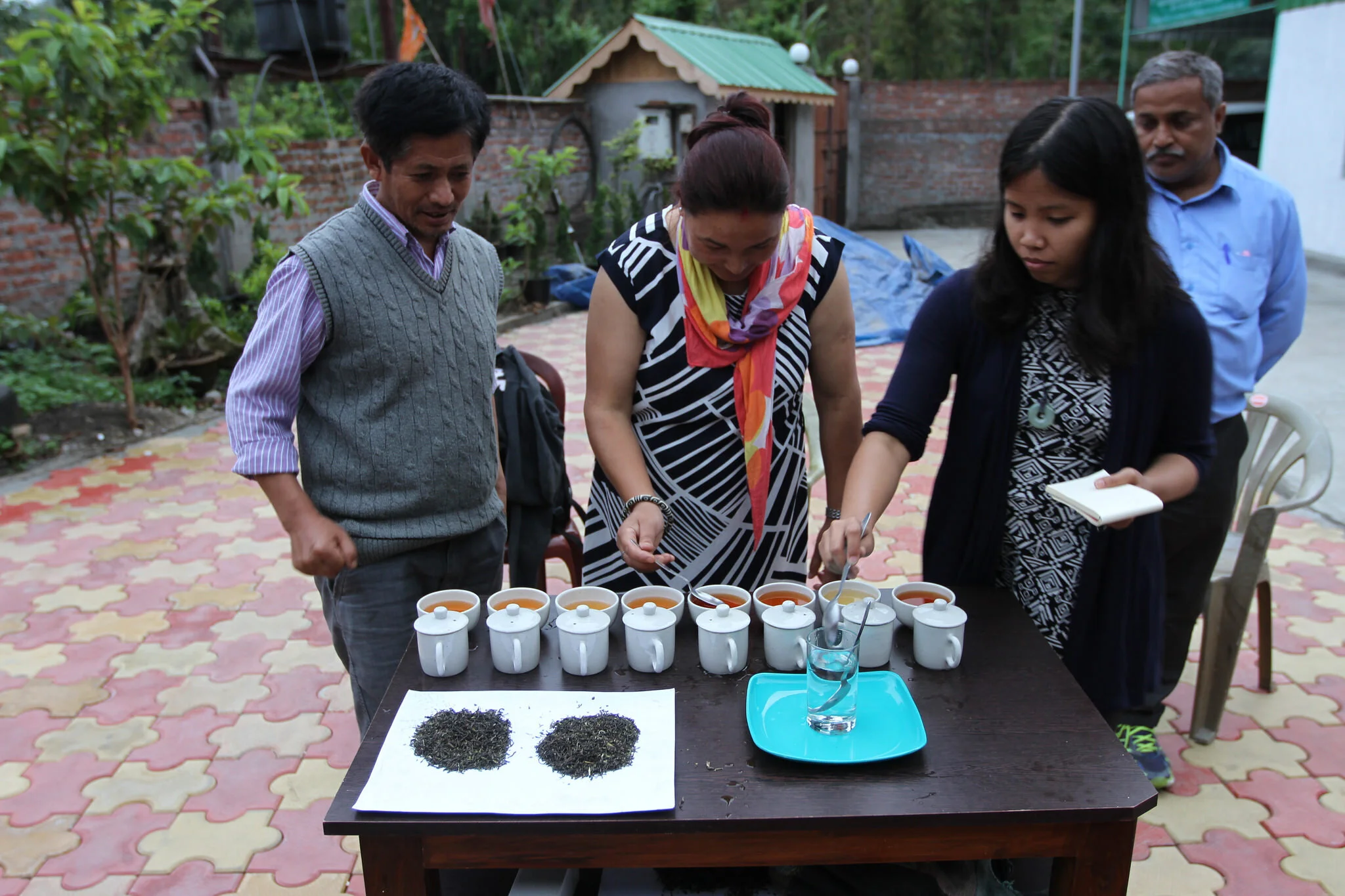Darjeeling and the Rise of Gorkhaland
Darjeeling has officially shut down for business. Tea production has ground to a complete halt. The Darjeeling tea industry is set to lose 20% of their annual production and 40% of their annual profit, on the order of $50 million (3.4 billion Indian Rupees). Even if plucking was to resume right now, which is incredibly unlikely, the loss could not be recovered. The ongoing drama of the situation has led many to wonder:
What is happening? And what does it mean for tea in Darjeeling?
We’ve done our best to brief you on what’s happening, why it’s happening, and what that might mean for the future of Darjeeling and the tea they produce. * See Disclaimer at bottom of article.
To be very short about it: The Gorkhas, a Nepali-speaking ethnic group who form a majority of the population of the Darjeeling Hills, have reignited their call for a separate Indian state of their own, called Gorkhaland. They have instituted a general strike and conducted numerous protests to get the government to hear their pleas. Since the Gorkhas form the bulk of the tea growing, plucking, and processing workforce, all tea processing has shut down indefinitely, leading to a complete halt of the Darjeeling tea industry at the peak of the second flush harvest.
Now to the bigger picture, with a little bit of context.
The District of Darjeeling and the surrounding area has been a hotbed of political control and conflict for hundreds of years. Since the 1780s, the Gorkhas, or ethnically Nepali people, have fought for control of the hills that encompass Darjeeling and up to Sikkim. Once the British began their Indian expansion, they fought a war and the British won, allowing them to draw the boundaries where they pleased and control the region for over a century.
Since British rule, and even before Indian independence, organized demands for a separate state of the Darjeeling hills and eventually demands for the state of Gorkhaland have been active since 1907. Additional petitions came in 1917, 1929, 1930, 1941, and in 1947 when India became independent. Since independence, more demands were made in 1952, 1980, and infamously in 1986 when the protests turned violent and resulted in over 1,200 deaths. The unrest resulted in 1988 with the formation of a special Gorkha council in the region. However, this council had very little governing control and again the demands for a separate state of Gorkhaland were raised in 2007. In 2011, another burst of protests led to replacing the council with the Gorkha Territorial Administration. In 2013, the Indian government passed a resolution to begin the formation of a new state in central India, Telangana, which officially became a state in 2014. This led to further protests and strikes on behalf of the Gorkha peoples to establish their own state. This catches us up to the present day.
On May 12th of this year, the West Bengal education minister stated that all students in the Darjeeling hills should be required to learn the language of Bengali. A majority of people in the hills don’t speak Bengali, but rather Nepali, which is recognized as an official language of the region. This lit the flame that would become the current call for a separate state of Gorkhaland. What has happened since is slightly convoluted depending on whom you ask.
Throughout June, protests intensified. The government shut down the internet. The police charged at protesters with batons and the army was later called in. Protesters set fire to buildings. Police claim they were shot at by protesters. Protesters have been killed. But the principle issue, that Bengalis mandate how the Gorkhas live, reignited the long-standing passions of the Gorkhas and their call for Gorkhaland. A general, indefinite strike was called for all workers in the region and there is currently talk of plans for a hunger strike which could lead to even more deaths.
We’ve heard from numerous sources that this movement includes the entirety of the tea workforce, and that they are completely committed to seeing this through to the end. Many have stated that they are willing to die for their cause. It’s increasingly unclear what the eventual outcome will be, as the debate has shifted in many different directions, has been filled with wild and mostly false accusations, and has led to little, if any, direct communication about the issues between those that seek redress and those that have the ability to provide it.
For the Darjeeling tea industry, “... the timing couldn’t have been worse - or better - depending on whom you choose to support,” says Kaushal Dugar, founder of Teabox, a company that specializes in sourcing premium quality tea from all over India and sells these products internationally. “We’d prefer not to comment on how people are feeling, or take sides.” We reached out to them for comments on their projections for the Darjeeling tea industry for the near and distant future:
“Short term impact: Almost all estates in Darjeeling are facing a huge financial loss, which will worsen if the problem persists or prolongs. Darjeeling summer teas will lose out it’s market share to Assam or any similar premium teas. Big or growing brands will try to avoid introducing more Darjeeling due to lack of certainty and try replicating existing one with other regional teas.
Long Term: Owing to limited land, limitations on automation, lack of manpower have made Darjeeling estates a bad business idea. Even among estate families, the new younger generation do not want to get into the business, which involves lot of passion, hard work, patience, uncertainty and limited return. Political turmoil like this will make new generation entrepreneurs and new buyers stay away until the situation improves drastically, and that will take time.”
One thing to keep in mind in this debate: One of the biggest motivating factors of this movement is that the Gorkhas have felt and continue to feel like second-class citizens. Working conditions are routinely very poor, wages are low, and they have no say or stake in how Darjeeling’s estates are run. They are ethnically different from the vast majority of the state they live in, and it’s apparent, at least to them, that the government of West Bengal cares little about serving the region’s interests. They point to the government’s lack of care in their region, specifically the lack of resources they offer for basic services and infrastructure, and the degradation that has occurred in the area as a result. They point out that not a single recognized estate in Darjeeling is owned by a Gorkha, and very few are managed by one. The government argues that the Gorkhas have been overly violent in their protests and have accused the Gorkhas of receiving funding from communist China. Further, they claim that Darjeeling, a strategically and economically important region, could not properly be governed by the Gorkha people.
The word that seems to surface most often in this struggle is “identity”. Anmol Gurung, a filmmaker and vocal member of the Gorkhaland movement, said in an online video:
“Gorkhaland is a people’s movement. Gorkhaland is about the stories, is about the lives of the common people living in Gorkhaland. We have never been against the Bengalis and never been against India. But we are against the policies of the Bengal government … It is a people’s movement. It is about their ethnic identity and their constitutional right. It is about the self-respect that we as Gorkhas deserve in the Indian sovereign … The policy makers of the Bengal government should understand this: they are firstly treating us as lesser Indians, which, I think, is against the law and against the Constitution of the nation that we all love so much.”
The Gorkhas are seeking a state where their identity matters and their interests are addressed. And even though there are a great many that doubt their capabilities, they feel that they could make the state economically viable, through what’s been referred to as the three “T’s”: tourism, timber, and of course tea, the very industry that West Bengal and the estate-holders are likely the most nervous to lose. What impact might this governmental restructuring have on the tea industry of Darjeeling?
Tea Making in Gorkhaland.
We got in contact with a member of the Gorkhaland movement, Allan Rai, through Elyse Petersen of Tealet. His community is deeply involved with the movement, as are the majority of locals in Darjeeling. He offers valuable insight into this issue as he is pursuing a course in tea management and dreams of being a part of the future of Darjeeling Tea.
We asked for his thoughts on what the tea industry could look like in Gorkhaland should the Gorkhas succeed in establishing a separate state.
Does tea play a role in your dream for a Gorkhaland?
“Darjeeling Tea is our pride and our heritage … However, the tea plantations and factories in the region do not flourish or prosper to their full potential due to several reasons, one of them being, inequitable distribution of monetary resources. The revenue collected from Darjeeling tea does not return back to these sources where it is produced. Thus, there is not much monetary support to maintain the factories and the wages of the workers are very low compared to the wages of workers in other states of our country … Pensions do not even amount to 1000 rupees (~$15) per month and medical facilities that are mentioned in the documents are there for name sake, as there are no medical units or hospitals. Owing to these factors a number of factories in the region have been shut down. This has led to numerous unemployment resulting in deaths due to starvation as well as depression.…
When it comes to the Tea Industry there is no facility that acts as a “Pull Factor” but instead has numerous “Push Factors” which drives away the youth from viewing the job in Tea Industries to be favourable. If a state is granted then the power and authority will rest in the hands of the people from this region thus the revenue that are collected will directly fall in the hands of those factories. This will lead to an increment in the wages of the workers which will ultimately lead to better production of Tea.”
How do you envision the future of Darjeeling's tea industry?
“We envision a future in which Tea industries are owned by the locals. With the ownership of these tea industries there will be no monopoly by the state government. The power will reside in the hands of the locals, the quality of tea produced will be enhanced, the workers in the industry will be more satisfied and receive a just payment which will be at par with the rest of the country and most importantly the industry will thrive and flourish. Also, within this change lies the fact that under the influence of the locals they themselves will name the price and hence the tea produced will be sold at fair prices.
Out of the numerous tea estates in Darjeeling the buyers are aware that only of a few have created a huge brand for themselves. The other small estates remain unheard of even though they produce high quality Darjeeling Tea. Hence, under the purview of the locals these small industries will also get an opportunity to introduce their tea in the world market.
9 new tea gardens in Darjeeling have turned into full scale organic farming due to the belief that this can take the growth of Darjeeling tea back to its peak …
In addition to ownership of the tea industry by locals, I envision that the tea business will be governed and managed by the locals. Instead of Darjeeling teas being sold in auction in Kolkata, I envision that a local auction in Darjeeling will be the most efficient way for the teas to get into the market …
The Tea Industry that seems to be struggling due to exploitation at the hands of the State will have a bright future if the demand for a separate state is fulfilled.”
Is it common for Gorkhas to have small tea gardens? Is it common for Gorkhas to be tea makers?
“There are numerous small gardens in the region owned by Gorkhas approximately accounting to more than 800. However, due to fact that all these gardens lack a manufacturing unit they are obliged to send their supply to the bigger tea estates. Tea making in this region is not a common profession. Tea making is viewed as a business rather than a profession due to the bigger tea industries. For the generation before us tea making might have been important and a profession but due to the fact that it offers little financial aid and lacks basic facilities people today do not consider it even as an option. However, for the rural people residing in the small villages this job opportunity would be the only source to maintain a living even though the wages that it provides would not be enough for a minimal standard of living. So, in this fast advancing world tea making is losing its pace in this region and a revival and restoration seems to be necessary.”
What is your biggest fear right now in regard to this conflict?
“My main cause of concern in this hour is the plight of the daily wage workers and the poverty stricken people. The daily wage workers earn a bare minimum per day making it nearly impossible for them and their families to get through the day. However, with the ongoing strike there is no work and hence no source of income. Yet, they remain in full support of the strike and demand and even participate in rallies. But the main question still remains how long can they continue without jobs? Even though people are helping each other there still remains a chance that somewhere people are suffering.”
We also asked Kaushal Dugar at Teabox about the viability of independent or co-op farm solutions in Darjeeling:
“Most of the local population directly earns their livelihood from the tea plantations and tourism. So things have to improve very soon but to get back to normal, it will take a long time. Small co-op won’t be an immediate solution in Darjeeling owing to complexity in ownership of property, and non-availability of vacant land. It’s almost impossible for co-ops to come up in existing gardens. Darjeeling is known for teas made from its old chinary bushes which can’t be replicated in new areas. It is very difficult to run a co-op in existing plantations in an organised way, even in the unlikely event that they shut down.”
Tea tasting at Yanki Tea.
There is at least one such example that we can point to of an independent tea garden and factory, Yanki Tea. Here, their mission is to “Promote Small Farmers, Socially and Economically”. With their own tea processing equipment, they need not rely on the larger farms for assistance and can market their own tea at their own prices.
In an article written in 2015, Kaushal Dugar of Teabox wrote, “Let’s face it – Darjeeling’s tea gardens are a 150 years old. They have survived two world wars, colonial rule, the Indian freedom movement, the establishment of a new country, several landslides, drought and high monsoons, the green revolution and much more. And yet, they are still standing, producing some of the finest teas in the world.”
Will Darjeeling survive this new struggle? Could there be a viable tea industry for a separate Gorkhaland? Given the current state of things, it seems difficult to imagine. It would take a lot of work and an unlikely collaborative effort with the West Bengal government to make it a reality. What many supporters try to convey is that the way things used to be in Darjeeling will not be tolerated much longer. Something has to change in order for there to be progress and growth. And if things don’t change? Will the Gorkhas, after all of the fighting, protest, and a potential hunger strike simply give up and go back to working amidst poor conditions in the tea fields? Will the call for a separate Gorkhaland be squelched forever if they are unsuccessful this time around? That too seems difficult to imagine.
* We’ve tried to look at this issue from different points of view, and report to you the facts as we have them. But we should keep in mind that anybody connected to this topic, including ourselves, has bias and potentially a lot to lose should the debate go one way or another. Also, for the purposes of transparency, I should note that two companies that are directly affected by this issue have sponsored World of Tea: currently, Vahdam Tea, and in the past Teabox (whom we talk to later in the article). That being said, they have not influenced this article in any way, shape, or form.
** Images property of Tealet.
** Title Image from I Love Darjeeling.


